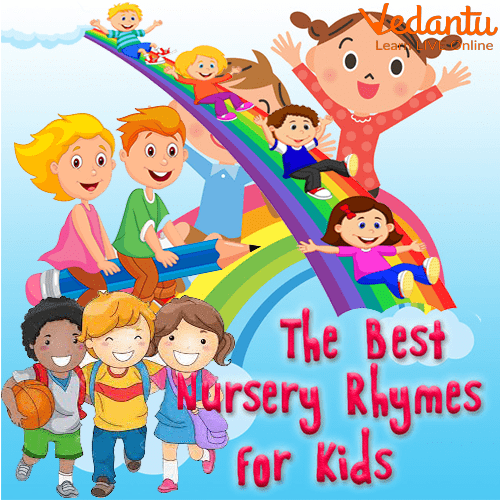Let’s Learn Some Popular Nursery Rhymes
Nursery rhymes are some of the most iconic and well-known traditional forms of children's songs. They've been played in various forms since around 1765 when they were written by John Newbery. In 1819, Mother Goose was published with over 100 rhyming baby verses that were to be sung to put babies to sleep at night.

The Best Nursery Rhymes for Kids
The tales told in nursery rhymes vary from fairy tales that kids are familiar with such as Snow White and The Princess Bride to those about animals such as Jack and Jill or Humpty Dumpty.
The most popular nursery rhymes are a type of song called a sing-song. These have easy-to-remember lyrics like "My mother had a baby...". Nursery rhymes are generally performed in the British Isles and many Commonwealth countries, such as Canada and Australia. They are also sung in other old English-speaking countries like Ireland, as well as in parts of Africa and Asia. There are also popular nursery rhymes that are based on old folk songs.
Why do Kids Like Nursery Rhymes?
Kids like nursery rhymes because it makes them laugh, and they learn many things in a fun way. Some kids like nursery rhymes because they feel there is a sense of humour, some kind of connectivity, or they relate the rhymes from their personal experiences. Like if they are reading a poem on the train then they visualise and share their experience of the train toy. Here is a listing of the most popular nursery rhymes sung by kids.
Most Popular Nursery Rhymes
Twinkle, Twinkle Little Star
This is a fun rhyme that kids can sing along with as they try to get in tune with the natural sounds around them. It's very easy to remember and great for helping little ones recognise and remember the names of stars.
Lyrics:
Twinkle, twinkle, little star
How I wonder what you are
Up above the world so high
Like a diamond in the sky
Twinkle, twinkle, little star
How I wonder what you are
When the blazing sun is gone
When he nothing shines upon
Then you show your little light
Twinkle, twinkle, all the night
Twinkle, twinkle, little star
How I wonder what you are
Humpty Dumpty
This is in the popular nursery rhymes album wherein this nursery rhyme represents the classic story of Humpty Dumpty falling off the wall, breaking his insides, and injuring himself by being upset. It's a very kind lesson in itself.
Lyrics:
Humpty Dumpty sat on a wall
Humpty Dumpty had a great fall
All the king's horses and all the king's men
Couldn't put Humpty together again
Humpty Dumpty sat on a wall
Humpty Dumpty had a great fall
All the king's horses and all the king's men
Couldn't put Humpty together again
Humpty Dumpty sat on a wall
Humpty Dumpty had a great fall
All the king's horses and all the king's men
Couldn't put Humpty together again.
Baa Baa Black Sheep
The most popular nursery rhyme of all time. This is a classic lullaby song that always brings smiles to the faces of children.
Lyrics:
Baa Baa black sheep, have you any wool?
Yes sir, yes sir, three bags full.
One for the master, one for the dame
One for the little boy who lives down the lane
Baa baa black sheep, have you any wool?
Yes sir, yes sir, three bags full.
Here We Go Round the Mulberry Bush
A childhood favourite rhyme with popular nursery rhymes lyrics that has been used for many years in our children's nurseries. The simple lyrics make it easy for kids to join in and sing along with you.
Lyrics:
Here we go round the mulberry bush
The mulberry bush
The mulberry bush
Here we go round the mulberry bush
On a cold and frosty morning
This is the way we wash our face
Wash our face
Wash our face
This is the way we wash our face
On a cold and frosty morning
Here we go round the mulberry bush
The mulberry bush
The mulberry bush
Here we go round the mulberry bush
On a cold and frosty morning
This is the way we brush our teeth
Brush our teeth
Brush our teeth
This is the way we brush our teeth
On a cold and frosty morning
Johnny Johnny
This is one of the most popular nursery rhymes that has been passed down through generations, although the original song was supposed to be called "Jenny Jenny."
Lyrics:
Johny, Johny,
Yes, papa?
Eating sugar?
No papa.
Telling lies?
No papa.
Open your mouth
Ha ha ha!

Children Enjoying Nursery Rhymes
Summary
In conclusion, parents need to remember that these are songs that kids can learn from and be entertained by. As long as you keep on track with the morals they teach and use them to help entertain your children, as well as teach them valuable life lessons, you should not have any problem with singing nursery rhymes to your kids. Be sure your family has a songbook or at least record them so you can play them when your children are older. Doing this will help them remember the joy and happiness these songs brought into their lives before they had to grow up.
1. Why do little children love to sing and dance along to Nursery Rhymes?


FAQs on Popular Nursery Rhymes of All Times for Kids
1. Why do little children love to sing and dance along to Nursery Rhymes?
The reason why the majority of people find these songs appealing is that they consistently have a rhythm and rhyme to them. Nursery rhymes continue to be a significant source of learning and interaction between children and adults as they get older.
2. Can children learn from nursery rhymes?
Yes, nursery rhymes are one of the most funniest and interesting methods to teach kids about different stuff like numbers, animals and fruits and so on.
3. What is the importance of learning nursery rhymes during childhood?
Nursery rhymes have been shown to be extremely important throughout the development of language because they Introduce children to words they won't typically encounter, such as "fetching a pail of water." Numerous rhymes also combine the use of numbers, counting, and numerous maths concepts.
4. Should I encourage my child to sing along with the rhymes?
Yes. The child has to be encouraged to sing along as it helps in their language development. They will be able to memorise the lyrics quickly too.





